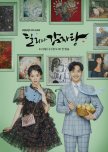A pearl of a Mona Lisa (and some other bright spots) among some swine
First impressions are critical. Or at least the conventional wisdom is that they are. It certainly seems to fit in the world of casting. Some actors are put in the group that gets lead roles and others, despite the quality of their work, seem destined to toil in supporting and guest roles for the duration of their career. Until “Dali and the Cocky Prince”, Park Gyu Young was an actor that appeared to be a member in solid standing of the latter group. Conventional wisdom isn’t always a hard and fast rule though.
As an actor who can move from one role to the next and completely remake themselves as an entirely new character with each iteration, Park Gyu Young has few peers. From ditzy and spoiled new office hire to beleaguered nurse with an unrequited love to musician turned monster fighter, she has played roles covering a vast spectrum of personalities and occupations and in different genres with almost unnoticeable overlap from one character to the next. Kim Da Li is not only unlike these previous characters played by Park Gyu Young, but there are scant comparisons with any characters. She’s quiet and curious and bright and mischievous and damaged and fierce and naive and, as the list up to this point suggests, complex. This actor and this role is an absurdly natural combination. Indeed, it’s difficult to imagine that anyone else could play Kiim Da Li and were anyone to attempt it, the production would likely come out very differently. From the standpoint of creating such a richly detailed character, the performance by Park Gyu Young is a massively successful achievement.
As for the story around her, Kim Da Li, after a chance encounter with Kim Min Jae’s Jin Moo Hak, she returns from abroad to Seoul to take control of the art museum formerly directed by her now suddenly deceased father. Her personal and professional lives get entwined with Jin Moo Hak. Meanwhile, a consortium is out to get the art museum and land around it for greedy, dark purposes and a former fiancee, Kwon Yool’s chaebol heir Jang Tae Jin, reappears with intentions to make amends. There’s plenty of plot and a somewhat large cast of characters that’s certainly adequate to fill out the standard sixteen episode length.
Somewhat tragically, a decision was made that these elements weren’t enough and that the show needed to be a romantic comedy with an emphasis on comedy. It’s a problematic strategy. The character of Kim Da Li acts very much as a central anchoring point which everything else revolves around. Park Gyu Young’s performance is consistent and outstanding throughout, but Kim Da Li, while many things, is not a comic character. That leaves the other players around her to fill in the humor and they are not up to the task. Whether it is Kim Min Jae, his secretary played by Hwang Bo Ra, his family or the museum staff, the comedy rarely works. Kim Min Jae tends to simply start bellowing and flailing his limbs during these painful sequences. The supporting cast tends to mug and pratfall and exaggerate and the sum of all it is a consistent misfire. Hwang Bo Ra, given the proper material, has proven that she has comedy skills. Some of the lesser known supporting cast (particularly the kitchen crew at Dondon), seem more than capable as well. But the script gives the actors precious little material leaving them flailing like fish out of water. It’s unfortunate as there’s some fine actors here. Not all of them are fine though and that exacerbates the script deficiencies. The performance by Lee Je Yeon as Jin Moo Hak’s scheming but incompetent stepbrother chiefly stands out for being unbearably poor.
When not trying to be a comedy that it is clearly not meant to be, however, “Dali and the Cocky Prince” is vastly more entertaining. When the macho, loud boasting and convulsive movements are turned off, Kim Min Jae is a marvelous partner for Park Gyu Young. And there are times when the Moo Hak takes a confrontational scene at a more subdued tone and it is terrific. These moments, the show gets serious traction. The story isn’t chock full of jaw-dropping reveals, but there’s enough intrigue and mystery to provide ample material for each episode. That Jang Tae Jin is who he is (despite a bizarrely bad hairstyle and some of the most poorly fitting business suits ever) also raises the enjoyment bar by a couple notches.
Further helping things by pitching in on the visuals, outside of Jang Tae Jin, the style team really nails it. Kim Da Li is iconic as a fashionable and powerful female.
Some of the other background work in the production misfires though. Some transitions are oddly timed. There’s some chase sequences that are pure filler. There’s never a point where a possible, credible alternative to the real not-yet-revealed villain is introduced to inject a bit of needed intrigue. And there’s a subplot setup around a museum intern that shows intriguing potential, but after a decent amount of screentime laying out the backstory, it’s hardly mentioned again.
As the show progresses, there’s just not a lot of mystery about where everything is headed. At one point a character actually exclaims, “How could the answer be so easy?” If that line pops up in a script and it seems like an accurate assessment, it should be a clarion call for some serious revisions. Despite the absence of any shred of uncertainty about who’s good or bad or really, really bad, it’s still a very good and entertaining show when Park Gyu Young is on screen (which is much of the time) and the comedy switch has been flipped to an “off” position. It is, however, an erratic enjoyment.
Recommended because Park Gyu Young turns in one of the finest performances of the year. With the strong ratings and the quality of the work here, she richly deserves more high profile roles.
As an actor who can move from one role to the next and completely remake themselves as an entirely new character with each iteration, Park Gyu Young has few peers. From ditzy and spoiled new office hire to beleaguered nurse with an unrequited love to musician turned monster fighter, she has played roles covering a vast spectrum of personalities and occupations and in different genres with almost unnoticeable overlap from one character to the next. Kim Da Li is not only unlike these previous characters played by Park Gyu Young, but there are scant comparisons with any characters. She’s quiet and curious and bright and mischievous and damaged and fierce and naive and, as the list up to this point suggests, complex. This actor and this role is an absurdly natural combination. Indeed, it’s difficult to imagine that anyone else could play Kiim Da Li and were anyone to attempt it, the production would likely come out very differently. From the standpoint of creating such a richly detailed character, the performance by Park Gyu Young is a massively successful achievement.
As for the story around her, Kim Da Li, after a chance encounter with Kim Min Jae’s Jin Moo Hak, she returns from abroad to Seoul to take control of the art museum formerly directed by her now suddenly deceased father. Her personal and professional lives get entwined with Jin Moo Hak. Meanwhile, a consortium is out to get the art museum and land around it for greedy, dark purposes and a former fiancee, Kwon Yool’s chaebol heir Jang Tae Jin, reappears with intentions to make amends. There’s plenty of plot and a somewhat large cast of characters that’s certainly adequate to fill out the standard sixteen episode length.
Somewhat tragically, a decision was made that these elements weren’t enough and that the show needed to be a romantic comedy with an emphasis on comedy. It’s a problematic strategy. The character of Kim Da Li acts very much as a central anchoring point which everything else revolves around. Park Gyu Young’s performance is consistent and outstanding throughout, but Kim Da Li, while many things, is not a comic character. That leaves the other players around her to fill in the humor and they are not up to the task. Whether it is Kim Min Jae, his secretary played by Hwang Bo Ra, his family or the museum staff, the comedy rarely works. Kim Min Jae tends to simply start bellowing and flailing his limbs during these painful sequences. The supporting cast tends to mug and pratfall and exaggerate and the sum of all it is a consistent misfire. Hwang Bo Ra, given the proper material, has proven that she has comedy skills. Some of the lesser known supporting cast (particularly the kitchen crew at Dondon), seem more than capable as well. But the script gives the actors precious little material leaving them flailing like fish out of water. It’s unfortunate as there’s some fine actors here. Not all of them are fine though and that exacerbates the script deficiencies. The performance by Lee Je Yeon as Jin Moo Hak’s scheming but incompetent stepbrother chiefly stands out for being unbearably poor.
When not trying to be a comedy that it is clearly not meant to be, however, “Dali and the Cocky Prince” is vastly more entertaining. When the macho, loud boasting and convulsive movements are turned off, Kim Min Jae is a marvelous partner for Park Gyu Young. And there are times when the Moo Hak takes a confrontational scene at a more subdued tone and it is terrific. These moments, the show gets serious traction. The story isn’t chock full of jaw-dropping reveals, but there’s enough intrigue and mystery to provide ample material for each episode. That Jang Tae Jin is who he is (despite a bizarrely bad hairstyle and some of the most poorly fitting business suits ever) also raises the enjoyment bar by a couple notches.
Further helping things by pitching in on the visuals, outside of Jang Tae Jin, the style team really nails it. Kim Da Li is iconic as a fashionable and powerful female.
Some of the other background work in the production misfires though. Some transitions are oddly timed. There’s some chase sequences that are pure filler. There’s never a point where a possible, credible alternative to the real not-yet-revealed villain is introduced to inject a bit of needed intrigue. And there’s a subplot setup around a museum intern that shows intriguing potential, but after a decent amount of screentime laying out the backstory, it’s hardly mentioned again.
As the show progresses, there’s just not a lot of mystery about where everything is headed. At one point a character actually exclaims, “How could the answer be so easy?” If that line pops up in a script and it seems like an accurate assessment, it should be a clarion call for some serious revisions. Despite the absence of any shred of uncertainty about who’s good or bad or really, really bad, it’s still a very good and entertaining show when Park Gyu Young is on screen (which is much of the time) and the comedy switch has been flipped to an “off” position. It is, however, an erratic enjoyment.
Recommended because Park Gyu Young turns in one of the finest performances of the year. With the strong ratings and the quality of the work here, she richly deserves more high profile roles.
Esta resenha foi útil para você?


 1
1





















